Minister of the Republic of Sudan, a graduate of Graduate School, gave a speech at Meiji University
Sep. 10, 2024
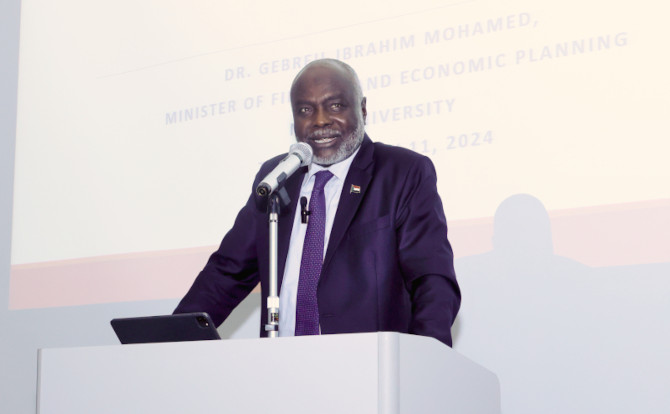
Dr. Gibril Ibrahim, giving his lecture
On July 11, Meiji University and the Embassy of the Republic of Sudan in Japan hosted a lecture by H.E. Dr. Gibril Ibrahim Mohamed Fedail, Minister of Finance and Economic Planning of the Republic of Sudan at the Multi-Purpose Room of the Global Front on the Surugadai Campus. Ninety people, including Meiji University students, faculty and staff, and the general public, attended the lecture.
Dr. Gibril Ibrahim entered the Graduate School of Political Science and Economics of Meiji University and received a master’s degree in economics in 1983 and a doctorate in economics in 1987. This lecture was held in conjunction with Dr. Gibril Ibrahim’s visit to Japan to convey the current situation in Sudan from Meiji University, his alma mater, and was moderated by Executive Trustee (Administrative Planning ) OKADA Seiji, former Ambassador Extraordinary and Plenipotentiary of Japan to the Republic of South Sudan.
Dr. Gibril Ibrahim entered the Graduate School of Political Science and Economics of Meiji University and received a master’s degree in economics in 1983 and a doctorate in economics in 1987. This lecture was held in conjunction with Dr. Gibril Ibrahim’s visit to Japan to convey the current situation in Sudan from Meiji University, his alma mater, and was moderated by Executive Trustee (Administrative Planning ) OKADA Seiji, former Ambassador Extraordinary and Plenipotentiary of Japan to the Republic of South Sudan.
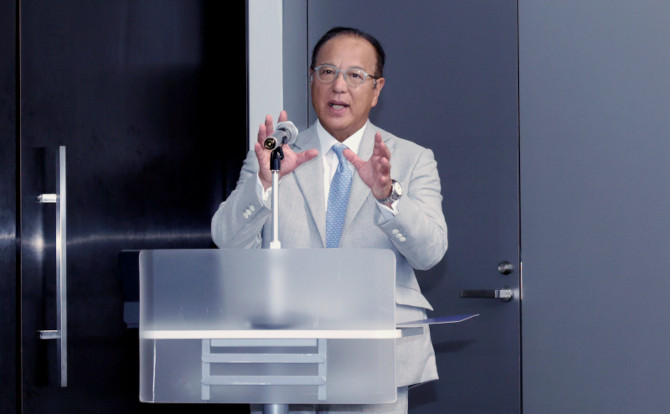
Executive Trustee OKADA who served as the moderator
In the first part, Dr. Gibril Ibrahim gave a lecture entitled “The Current Crisis and Prospect for Rehabilitation in Sudan.”
In the second part, firstly, a video message from Dr. KAWAHARA Naoyuki, President of the NPO Rocinantes, which is engaged in support activities in Sudan, was played. After that, in addition to Dr. Gibril Ibrahim and Executive Trustee OKADA, Ms. DOHI Yuko, Senior Advisor at the Japan International Cooperation Agency (JICA), and Associate Professor UDO Satoshi at the School of Global Japanese Studies took the stage for a panel discussion on the theme of “Post-Conflict Reconstruction and Support Activities.” In the discussion, Dr. KAWAHARA and Ms. DOHI each introduced their support activities in Sudan.
At the end of the lecture, President UENO Masao said in his address, “I sincerely hope that this lecture has deepened your understanding of the current situation and reconstruction support activities in Sudan, and that it has been an opportunity to consider what is necessary for peace and coexistence in the international community,” and the lecture was closed.
Summary of Dr. Gibril Ibrahim’s lecture, “The Current Crisis and Prospect for Rehabilitation in Sudan”
I am delighted to be back at Meiji University after almost 40 years. When I was a student, Professor SHIRAISHI Shiro (former professor at the School of Political Science and Economics, deceased) in particular helped me a lot. I would like to express my sincere gratitude to many people for their support during my seven years in Japan.
After leaving Japan, I taught at a university in Saudi Arabia for five years, passing on the economics and marketing knowledge I had acquired at Meiji University to my students. I then returned to Sudan, started an airline company and spent more than 10 years in airlines and air freight business. However, political turmoil led to 20 years of civil war.
The peace agreement was signed on December 5, 2022, and I took up a position in charge of the country’s financial and economic planning. Since then, I have been tackling the debt problem in collaboration with friendly countries and international financial institutions.
Meanwhile, in March 2023, the Rapid Support Force (RSF) rebelled against the Sudan Armed Forces, and an armed confrontation broke out on April 15.
The country is once again devastated, with some 80% of the country’s income lost overnight, more than 10 million people have lost their homes, and 2 million people have been displaced to neighboring countries. Those who have been displaced within the country are supported by the limited resources of their communities.
I am proud of the Sudanese people, who support each other despite their limited resources. I believe there is also a spirit of mutual support in Japan. I think this kind of spirit is human nature.
The economy is in a very difficult situation, with production halting and trade stagnating due to insecurity. Capital outflows and a shortage of foreign exchange caused the currency to plummet and inflation to reach nearly 200%. Banks will also take months to normalize. It has also suspended development projects, and we have taken austerity measures, including cutting the salaries of civil servants to 60%.
The process of reconstruction from war involves a complex intertwining of social, economic, and physical influences. As Minister of Finance and Economic Planning, I am formulating the following strategy.
First, we will focus on human resource development, create jobs through public works and reconstruction activities, invest in education and vocational training, and develop microcredit mechanisms to help individuals start businesses. At the same time, we will develop infrastructure, such as roads, bridges, railways, ports, and airports. We will call on Japanese companies to invest and cooperate in building a new Sudan.
Achieving reconstruction requires firm political leadership and coordination, but also understanding and concrete assistance from the international community.
Note: The statements of each speaker, including Dr. Gibril Ibrahim, are based on their own opinions and ideas and do not represent the views of Meiji University.
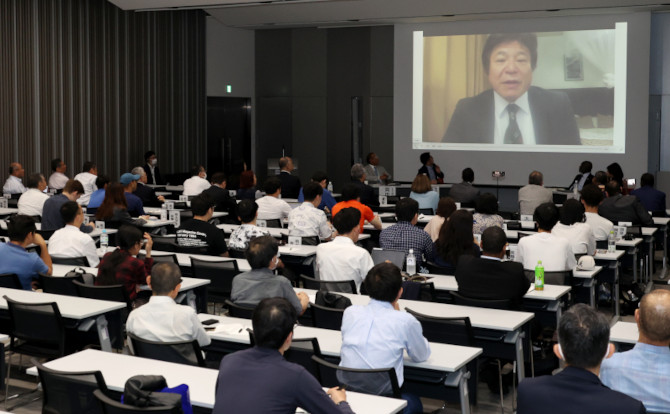
Video message from Dr. KAWAHARA Naoyuki, President of the NPO Rocinantes
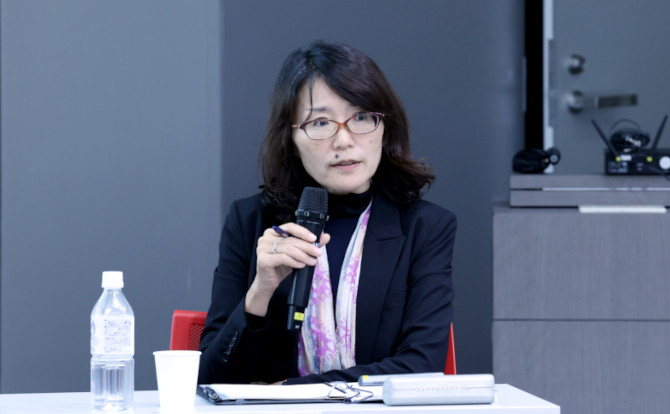
Ms. DOHI Yuko, Senior Advisor at the Japan International Cooperation Agency (JICA)
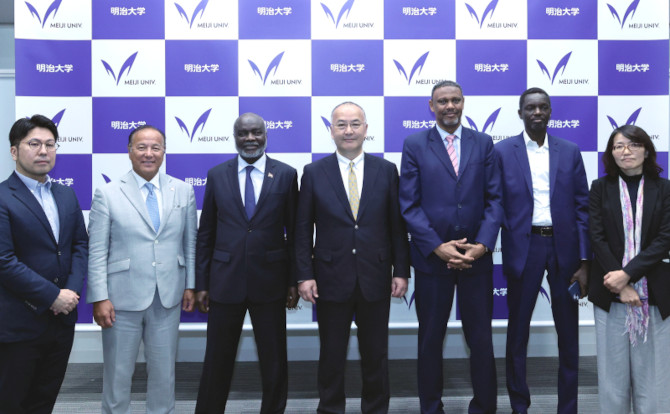
Associate Professor UDO, Executive Trustee OKADA, Dr. Gibril Ibrahim and President UENO. Ms. DOHI on the far right.


